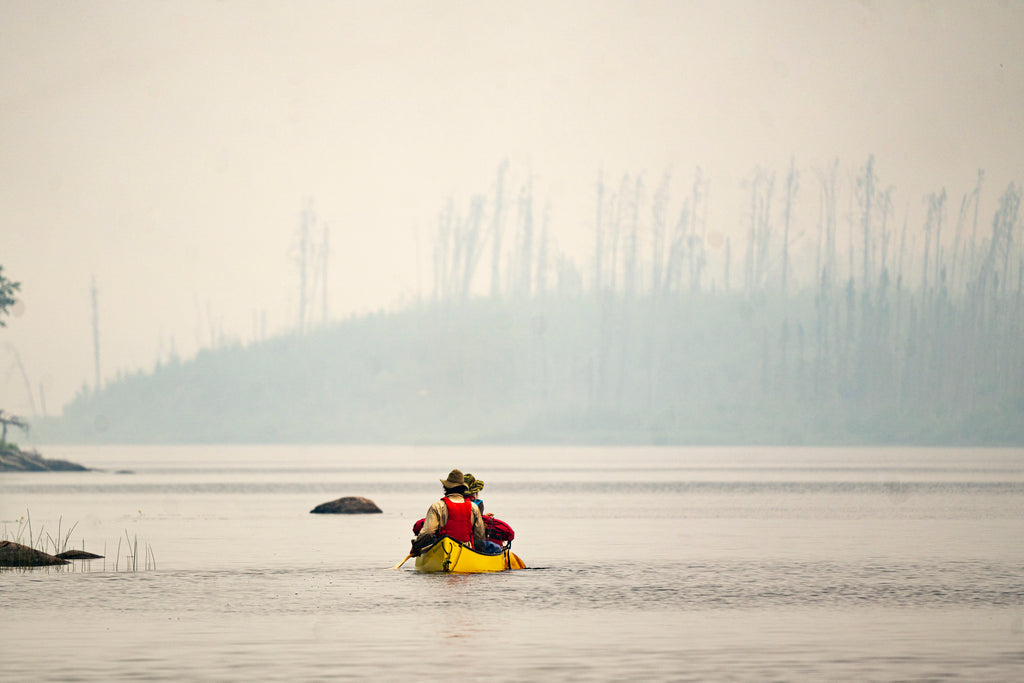Loaded up with 60 days of food, camping gear, and maps spanning 1300km, David Jackson and his partner Leah began their paddle and portage trip in Ontario’s most northern community of Fort Severn last summer. Follow their incredible journey and encounters with wildfires, dry creeks, flooded rivers, overgrown trails, and the constant torment of bugs along the traditional routes of the Nishnawbe people.
---
When we left Kingfisher Lake, an extremely difficult stretch lay ahead. First, we would run a big river full of serious rapids, and then we would begin a watershed crossover to Big Trout Lake through a series of creeks we knew to be miserable.

To make matters worse, we could see black plumes of smoke rising from a fire threatening to cut us off. For ten days, we waded up creeks, found awful portages, recut trails, and then found our way down a small waterway that was almost dry.

Each morning, we would begin carrying our canoe and gear over precarious boulder fields for kilometres at a time, socked in by dense smoke, terrified that we would be burned alive in that place. If breathing was hard, the bugs made our anxieties worse, and all day, for every moment between our nights in the tent, we fought for breaths, bled, and struggled until alas we reached the expansive and crystal-clear water of Big Trout Lake, the head of the Fawn River.

This point was a significant turning of the tide for many reasons. We had crossed over eight watersheds to get here, going up and down entire rivers, crossing through long trails overland. Finally, we would only have to go downhill for 500 or so kilometres to the polar bear infested coast of Hudson Bay. We lingered a few days on Big Trout Lake, taking refuge on a small rocky island where the bugs were at bay, swimming often, reading, working on our journals, eating fish, and realizing the monster that was becoming our hunger. When we felt it was time to depart, the lake asked us to be patient, trapping us on our little oasis in a frigid north storm, waves hammering the shore, bound in our tent. With time to contemplate, we talked about the area. On a sandy shore of the lake, found human remains were carbon-dated to 8,000 years old. We weren’t the first to be windbound, and we wouldn’t be the last.

When we were finally able to, we paddled away from our windbound camp in the cold, fading storm with sleet stinging our cheeks. The sun broke as we reached the first significant falls on the river, a roar of water falling through bedrock cliffs, a miasma of turquoise. In the middle of the rapid, in a stand of spruce trees, we made camp in a clearing used by upriver Wapekeka First Nation to hunt and fish. Schools of walleye circled below us as we swam in the cold water, dinner beneath our feet. I had hidden and carried a little ring I loved, the only one I could find made of wood and built to last forever, a certain claim to toughness I thought was a suiting metaphor. Forty-five days and a thousand kilometers from where we started, almost four years from when we first met, Leah said yes when I asked her to marry me.

Black spruce stood by for support, and dragonflies greedily ate bugs in front of a big moon, all the while northern waters flowed forever and a day at our backs. Even if the place doesn’t carry a name on the map, for us, it was love at first falls. The remainder of the trip, following a wild river to the ocean, would be with a tighter bond on this route of old connections. What lay ahead were days of major rapids, the worst bugs of our trip, a gauntlet of polar bears, and the bitter-sweet return to life on land.




